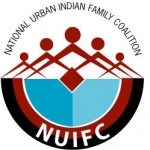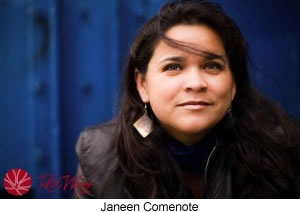 |
Canku Ota
|
 |
|
(Many Paths)
|
||
|
An Online Newsletter
Celebrating Native America
|
||
|
August 2013 - Volume
11 Number 8
|
||
|
|
||
|
First Nations
Partners with NUIFC to Add Urban Indian Focus -
|
||
|
|
| In May 2013, First Nations announced it received a substantial
grant from The Kresge Foundation that we’ll use to help improve
numerous American Indian nonprofit organizations in urban or metropolitan
locations. The project will accomplish this by helping build the capacity
of those organizations, which means we’ll provide tailored training
and technical assistance that will help them better organize, strategize,
manage and grow their organizations. In turn, they will become stronger,
more efficient and more effective in achieving their missions.
And in the spirit of cooperation and collaboration that we use
in everything we do with Native communities, we have partnered with
a great organization that provides us with enhanced “street
smarts” in those urban communities – the National Urban
Indian Family Coalition, or NUIFC, which is a network of urban Indian
organizations that strengthen urban Native families. It is led by
Executive Director Janeen Comenote, who founded the organization. Janeen Comenote The partnership will draw upon First Nations’ extensive capacity-building expertise and NUIFC’s networks, evaluation and data-collection experience, and insider knowledge of urban Indian organizations and their needs. Over the life of the Kresge Foundation grant, which runs to the end of 2016, First Nations and NUIFC with work directly with as many as nine urban Native American nonprofits to help them improve their management and leadership skills and boost their organizational effectiveness, provide customized assistance and training, host an annual capacity building conference for participants, and document the project’s best practices and potential for replication in other Native American urban communities. First Nations Senior Program Officer Montoya Whiteman (Cheyenne and Arapaho Tribes) is managing the grant and the partnership. “For 32 years, First Nations has worked primarily in rural and reservation-based Native American communities, helping them develop much-needed stronger economies by doing our work on several fronts,” noted Michael E. Roberts (Tlingit), First Nations president. “We’re now excited to take our successful track record and apply it to urban communities of American Indians. Native nonprofits that are more effective at what they do and how they are managed are a key resource to the health, prosperity and growth of Indian communities, whether rural or urban.” Urban Indian organizations, some of which were launched in the 1940s and 50s, are an important support to Native families and individuals, providing cultural linkages as well as being a hub for accessing essential services. There are nearly 250 local or state-focused urban Indian organizations in NUIFC’s network representing over 600,000 Indians nationwide. According to Janeen, one of the primary intentions of creating the NUIFC is to ensure access to traditionally excluded organizations and families, and to focus attention on the needs of urban Indians. “Our primary goal is to contribute to better living standards and develop a resource pool through which we can reach this goal,” Janeen said. “I cannot overemphasize the importance and impact this innovative work will have in strengthening the urban Indian nonprofit sector and thereby improving the outcomes for our communities. Projects and partnerships like this provide important acknowledgment that the needs of our urban populations are important and being addressed.” By Randy Blauvelt, First Nations Senior Communications Officer |
|
|
||
|
|
||
| Canku Ota is a free Newsletter celebrating Native America, its traditions and accomplishments . We do not provide subscriber or visitor names to anyone. Some articles presented in Canku Ota may contain copyright material. We have received appropriate permissions for republishing any articles. Material appearing here is distributed without profit or monetary gain to those who have expressed an interest. This is in accordance with Title 17 U.S.C. Section 107. | ||
|
Canku Ota is a copyright ©
2000 - 2013 of Vicki Williams Barry and Paul Barry.
|
||
 |
 |
|
|
The "Canku
Ota - A Newsletter Celebrating Native America" web site and
its design is the
|
||
|
Copyright ©
1999 - 2013 of Paul C. Barry.
|
||
|
All Rights Reserved.
|
||
 This
is a bit of a departure for First Nations. Throughout its more than
three decades of existence, First Nations has primarily focused
on rural and reservation-based Native communities. We are now expanding
into a new focus area that helps address the well-being of Native
Americans who happen to live and work in bigger cities.
This
is a bit of a departure for First Nations. Throughout its more than
three decades of existence, First Nations has primarily focused
on rural and reservation-based Native communities. We are now expanding
into a new focus area that helps address the well-being of Native
Americans who happen to live and work in bigger cities. Janeen
knows first-hand the situation of urban Indians. She was born and
raised in Seattle, Washington – she is Hesquiaht and Kwakiutl
First Nation from her mother’s side, and Oglala Lakota and
enrolled Quinault from her father’s side – and she has
worked in this area, in one form or another, for nearly 20 years.
“I am driven to do this. I have worked with Native street youth,
Indian child welfare, as well as poverty research and program development,”
she says. “This breadth and depth of experience has given me
a unique view into the day-to-day realities of Native people living
in urban areas as well as provided the impetus to do what I can
do to help address some of those disparities.”
Janeen
knows first-hand the situation of urban Indians. She was born and
raised in Seattle, Washington – she is Hesquiaht and Kwakiutl
First Nation from her mother’s side, and Oglala Lakota and
enrolled Quinault from her father’s side – and she has
worked in this area, in one form or another, for nearly 20 years.
“I am driven to do this. I have worked with Native street youth,
Indian child welfare, as well as poverty research and program development,”
she says. “This breadth and depth of experience has given me
a unique view into the day-to-day realities of Native people living
in urban areas as well as provided the impetus to do what I can
do to help address some of those disparities.”